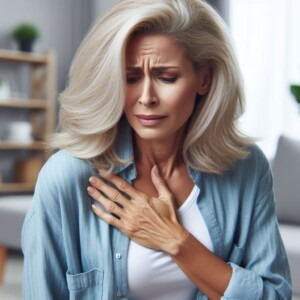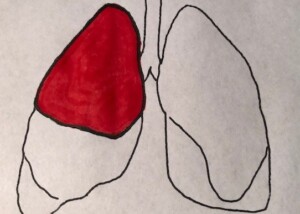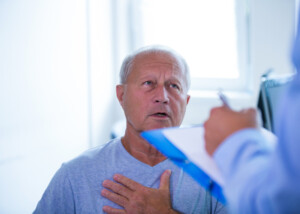
Many cancers, some you’d never even think of, cause chest pain, soreness or aching.
Does this mean that next time your chest hurts, you should fear it’s cancer?
“Multiple cancer types can cause chest pain,” says Jonathan Stegall, MD, an integrative oncologist and medical director for The Center for Advanced Medicine, an adult cancer treatment center in Alpharetta, GA.
Which types of cancer cause chest pain?
Lung. The lungs are located in the chest wall, so of course, tumors growing in a lung have the potential to cause discomfort in this region.
Bone and soft tissue. “Aside from the obvious answer of lung cancer, a tumor that occurs in bones, or in soft tissue known as a sarcoma, can cause chest pain if it arises in the chest wall,” says Dr. Stegall.
For example, a malignant tumor can start developing in the ribs.
It stands to reason that this can cause pain in the chest, being that this is where the ribs are located.
Another possibility is a malignancy arising from the sternum or breastbone – which would be extremely rare, though.
Lymphoma (non-Hodgkin). In addition to pain in the chest, this cancer can cause a feeling of pressure there.
Lymphoma is a malignancy of the lymph nodes, and there are lymph nodes in the chest.
Lymphoma in these nodes can cause them to press on the windpipe, leading to discomfort in the chest.
This cancer can also cause pressure on the superior vena cava vein that’s located in the chest area.
Leukemia (acute promyelocytic). This blood cancer can cause a blood clot in the leg (deep vein thrombosis).
If a piece of this clot, or the whole thing, breaks away and travels to the lung (where it becomes a pulmonary embolism), it can cause chest pain.
Trunk organs. “Gastrointestinal cancers such as stomach cancer, pancreatic cancer and liver cancer can cause chest pain,” says Dr. Stegall.
“This is primarily due to a growing tumor pressing on the diaphragm, and thus the structures in the chest.
“These gastrointestinal cancers can cause referred pain to the chest as well.”
Esophageal. The esophagus (food pipe) is located in the chest. If a tumor is in it, this can cause hurting, burning or pressure in this area.
However, esophageal cancer actually rarely causes chest pain.
Its premier symptom is food impaction in the esophagus — which causes a feeling of food sticking or being trapped in the chest.
Metastasis
Keep in mind that when a cancer spreads (metastasizes), it can grow in the lungs, such as colon cancer and melanoma, even though the primary tumor site is nowhere near the chest.
The lungs are also a common metastatic site for breast cancer.
Another striking point to be aware of is that by the time a cancer is causing pain or discomfort in the chest, the patient will very most likely have other troubling symptoms.
These other symptoms run the entire gamut such as shortness of breath, unexplained fatigue and weight loss, mental difficulties, fever, soaking night sweats, ear pain, arm pain, itching skin, yellow skin, you name it.
That’s why it’s so important to see a doctor for new-onset, unexplained symptoms.

 Jonathan Stegall, MD,
Jonathan Stegall, MD,
























